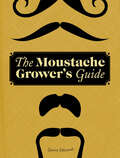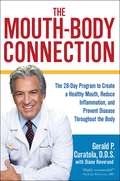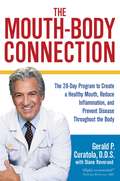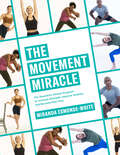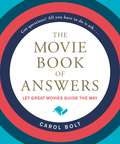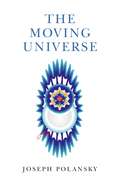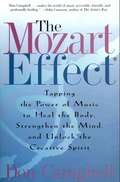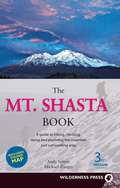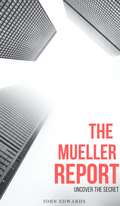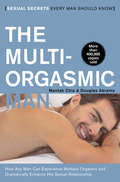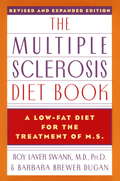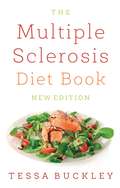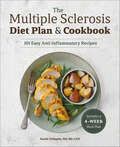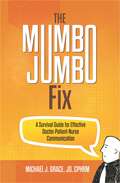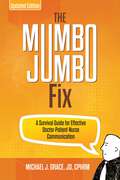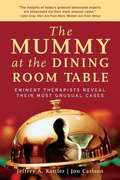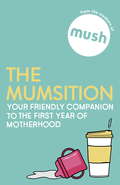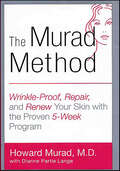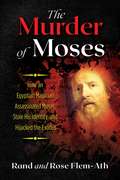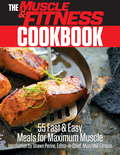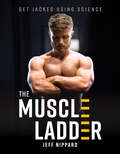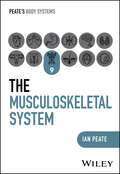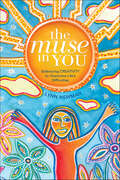- Table View
- List View
The Mouse's House: Children's Reflexology for Bedtime or Anytime
by Melissa Muldoon Susan QuayleMouse finds a new house and calls upon her woodland friends to help her to make it a cosy home, but will it be ready in time for winter? Combining reflexology with delightfully engaging rhymes and illustrations, this book features easy-to-follow diagrams and instructions for giving basic reflexology to a child during a bedtime (or anytime) story. This unique book, written by a specialist maternity reflexologist, uses this non-invasive complementary therapy to help strengthen the bonding process between parent (or carer) and child and offers a gentle remedy for problems such as sleep difficulties, anxiety and mild pain. No prior reflexology knowledge is required.
The Moustache Grower's Guide
by Lucien EdwardsWhether it's a Handlebar, a Fu Manchu, or a Laser Loop, this illustrated guide will help men everywhere achieve the moustache of their dreams. Included are instructions for how to grow, groom, and maintain 30 classic and modern moustaches, as well as fashion advice on how to rock each look. Outdoorsy types can go wild with the Lumberjack and some flannel, while those aspiring to steampunk style should dress up the Aeronaut with a tuxedo or nautical gear. Fora dash of hipster irony, the Crustache or the Pyramid looks sharp with skinny jeans and glasses. With tons of illustrations and exclusive tips from professional competitors, The Moustache Grower's Guide will add major style to any 'stache.
The Mouth-Body Connection: The 28-Day Program to Create a Healthy Mouth, Reduce Inflammation and Prevent Disease Throughout the Body
by Diane Reverand Gerald P. CuratolaAcclaimed oral health expert and wellness pioneer, Dr. Gerry Curatola, explores the bi-directional relationship between the health of your mouth and your body, and provides a groundbreaking program for creating a healthy mouth that will help maintain a healthy body. The mouth acts as mirror and a gateway and reflects what is happening in the rest of your body and the health of your mouth appears to have a profound impact on the rest of your body. Chronic, low-grade oral disease is a major source of inflammation throughout your body, which can sometimes result in serious systemic problems, including cardiovascular disease, type 2 diabetes, obesity, and premature birth. The Mouth-Body Connection educates the reader on the natural ecology of the mouth. The oral microbiome consists of communities of 20 billion microorganisms of more than six hundred types-keeping these communities balanced is the key to well-being. Dr. Curatola's program, thirty years in the making, helps to restore microbiome balance and reduce health-destroying inflammation. The Curatola Care Program fosters a healthy oral microbiome by means of diet, supplements, exercise, and stress reduction. Four weeks of meal plans and fifty delicious recipes will convince you that eating for balance can be a treat. There are supplement schedules for each stage, two high-intensity band workouts that take only 15 minutes twice a week, relaxation techniques, and yoga postures to fight inflammation.In just four weeks, you will reboot your body and begin to take control of your health. Best of all, your brilliant smile will prove that you have never felt better. p.p1 {margin: 0.0px 0.0px 0.0px 0.0px; font: 12.0px Geneva} p.p2 {margin: 0.0px 0.0px 0.0px 0.0px; text-indent: 36.0px; font: 12.0px Geneva} p.p3 {margin: 0.0px 0.0px 0.0px 0.0px; text-indent: 36.0px; font: 12.0px Geneva; min-height: 16.0px} p.p4 {margin: 0.0px 0.0px 0.0px 0.0px; font: 12.0px Geneva; min-height: 16.0px} span.s1 {font: 12.0px Symbol}
The Mouth-Body Connection: The 28-Day Program to Create a Healthy Mouth, Reduce Inflammation and Prevent Disease Throughout the Body
by Diane Reverand Gerald P. CuratolaAcclaimed oral health expert and wellness pioneer, Dr. Gerry Curatola, explores the bi-directional relationship between the health of your mouth and your body, and provides a groundbreaking program for creating a healthy mouth that will help maintain a healthy body. The mouth acts as mirror and a gateway and reflects what is happening in the rest of your body and the health of your mouth appears to have a profound impact on the rest of your body. Chronic, low-grade oral disease is a major source of inflammation throughout your body, which can sometimes result in serious systemic problems, including cardiovascular disease, type 2 diabetes, obesity, and premature birth. The Mouth-Body Connection educates the reader on the natural ecology of the mouth. The oral microbiome consists of communities of 20 billion microorganisms of more than six hundred types-keeping these communities balanced is the key to well-being. Dr. Curatola's program, thirty years in the making, helps to restore microbiome balance and reduce health-destroying inflammation. The Curatola Care Program fosters a healthy oral microbiome by means of diet, supplements, exercise, and stress reduction. Four weeks of meal plans and fifty delicious recipes will convince you that eating for balance can be a treat. There are supplement schedules for each stage, two high-intensity band workouts that take only 15 minutes twice a week, relaxation techniques, and yoga postures to fight inflammation.In just four weeks, you will reboot your body and begin to take control of your health. Best of all, your brilliant smile will prove that you have never felt better. p.p1 {margin: 0.0px 0.0px 0.0px 0.0px; font: 12.0px Geneva} p.p2 {margin: 0.0px 0.0px 0.0px 0.0px; text-indent: 36.0px; font: 12.0px Geneva} p.p3 {margin: 0.0px 0.0px 0.0px 0.0px; text-indent: 36.0px; font: 12.0px Geneva; min-height: 16.0px} p.p4 {margin: 0.0px 0.0px 0.0px 0.0px; font: 12.0px Geneva; min-height: 16.0px} span.s1 {font: 12.0px Symbol}
The Movement Miracle: The Essentrics Stretch Program to Increase Strength, Improve Mobility and Become Pain Free
by Miranda Esmonde-WhiteFrom Canadian fitness pioneer, bestselling author and PBS star Miranda Esmonde-White, the definitive Essentrics stretching and strengthening book, designed to keep your body strong, mobile and pain-free whatever your age.Miranda Esmonde-White's fitness revolution began with a simple insight: many exercise programs, including the ones she used to teach at her own studio, actually cause injury and prematurely age the body, bulking muscles and restricting joints. Throwing out the idea of "no pain, no gain," she studied how we are actually designed to move, creating a program that stretches and strengthens all the muscles in the body in a balanced way, enhances the full range of motion of every joint, and unglues stuck connective tissue. The result is Essentrics, a groundbreaking practice of gentle movement, respecting the muscle chains and joint mobility of the body, that scientists from Harvard, Adelphi and McGill universities have validated as a way to keep us strong, flexible and fit for life, as well as providing immense benefits for brain and digestive health.Where her previous bestsellers, Aging Backwards and Forever Painless, focused on anti-aging and pain-relief, The Movement Miracle is the Essentrics bible. In beautifully shot illustrations, twelve models who range in age from their twenties to their late sixties—all of whom have benefited from the program—demonstrate 100 sequences of gentle movements that can be combined to meet the needs of everyone from office workers to elite athletes. Another section of the book concentrates on posture, teaching us how to counteract the harmful impacts of sedentary living and too much screen time. The revolution Esmonde-White offers us all: only twenty-five minutes a day of gentle movement, following the Essentrics formula, will radically change and strengthen your body, relieve you of pain, replenish your energy and keep you young, no matter your age.
The Movie Book of Answers
by Carol BoltAn updated, repackaged edition of the bestselling divination tool and party favorite - ask a yes or no question, open the book, and discover your answer in the form of quotations from the world's most iconic films.Still looking for a way to know what tomorrow will bring? Here's where you'll find the answers that only Hollywood could provide. A party favorite, this fun, weirdly wise little book is for you. The Movie Book of Answers contains answers from over 150 films, including advice from classics such as Casablanca ("Maybe not today. Maybe not tomorrow, but soon."), and pithy gems from modern blockbusters like Fargo ("You're darned tootin'!"). So what are you waiting for?... Go ahead-ask your question.
The Moving Universe
by Joseph PolanskyThe Moving Universe is designed for the student of astrology, and is the only book on transits that deals with both the mundane and spiritual interpretations. It is as much a spiritual teaching as it is an astrology book. The mundane (worldly) interpretation shows what is likely happening in the outer life. The spiritual perspective gives the interior lessons and challenges that the transits are bringing. Understanding these issues gives the student a deeper perspective on what&’s going on in the client&’s (or their own) life. Many students of astrology are on a spiritual path, and understanding the spiritual perspective will help them.
The Mozart Effect: Tapping the Power of Music to Heal the Body, Strengthen the Mind, and Unlock the Creative Spirit
by Don CampbellAnyone who has ever seen a two-year-old start bouncing to a beat knows that music speaks to us on a very deep level. But it took celebrated teacher and music visionary Don Campbell to show us just how deep, with his landmark book The Mozart Effect.Stimulating, authoritative, and often lyrical, The Mozart Effect has a simple but life-changing message: music is medicine for the body, the mind, and the soul. Campbell shows how modern science has begun to confirm this ancient wisdom, finding evidence that listening to certain types of music can improve the quality of life in almost every respect. Here are dramatic accounts of how music is used to deal with everything from anxiety to cancer, high blood pressure, chronic pain, dyslexia, and even mental illness.Always clear and compelling, Campbell recommends more than two dozen specific, easy-to-follow exercises to raise your spatial IQ, "sound away" pain, boost creativity, and make the spirit sing!
The Mt. Shasta Book
by Andy Selters Michael ZangerThe Mt. Shasta Book is the ultimate guide to safely the hiking, backpacking, and climbing routes up the 14,162-foot mountain. In addition, this guide covers the area's skiing, snowboarding, water activities, and mountain biking trails. With over 50 combined years of experience as Shasta guides, the authors are seasoned experts on the mountain and its surroundings. The print edition comes with a fold-out 4-color topographic map.
The Mueller Report
by John EdwardsThe Mueller Report is the report from special counsel Robert Mueller
The Multi-Orgasmic Man: Sexual Secrets Every Man Should Know
by Mantak Chia Douglas AbramsAt last, simple physical and psychological techniques that allow men to fulfill their dreams and women's fantasies. Learn to Separate Orgasm and Ejaculation! Enjoy Increased Vitality and Longevity! Become Multi-Orgasmic Now!
The Multiple Sclerosis Diet Book
by Roy Laver Swank Barbara Brewer DuganHundreds of new recipes for dishes that taste terrific but stick to the diet rules so important for controlling M.S.--now completely revised to conform to the latest medical research.From the Hardcover edition.
The Multiple Sclerosis Diet Book: Help And Advice For This Chronic Condition
by Tessa BuckleyEvidence increasingly suggests that nutritious food can improve the health and well-being of those with MS. This book explains the role that healthy eating may play in MS, as well as other autoimmune diseases, such as coeliac disease and type 1 diabetes. The updated new edition of this popular book presents information about diets designed to help those with MS, incuding recent influences such as the Paleo diet, and advises on which foods to eat, which foods to avoid and why. It also presents research findings into the importance of vitamin D and Omega 3 fatty acids, and discusses the effects salt and sugar may have on people with MS. Topics include:the so-called Swank or low-fat diet, named after Dr Roy Swank. who pioneered it in the 1940sthe Best Bet diet which has a focus on avoiding dairy, grains and red meat Dr George Jelinek's Overcoming MS Diet, which emphasises supplementation and sunlight (for vitamin D);the Wahls diet, or Dr Terry Wahls version of the Paleo diet supplements ? benefits and dangersfood intolerancepractical advice on food preparationcoping with problems such as swallowing and fatiguenew recipes updated case histories, including two doctors with MS who have successfully treating their own symptoms with diet
The Multiple Sclerosis Diet Book: Help And Advice For This Chronic Condition
by Tessa BuckleyEvidence increasingly suggests that nutritious food can improve the health and well-being of those with MS. This book explains the role that healthy eating may play in MS, as well as other autoimmune diseases, such as coeliac disease and type 1 diabetes. The updated new edition of this popular book presents information about diets designed to help those with MS, incuding recent influences such as the Paleo diet, and advises on which foods to eat, which foods to avoid and why. It also presents research findings into the importance of vitamin D and Omega 3 fatty acids, and discusses the effects salt and sugar may have on people with MS. Topics include:the so-called Swank or low-fat diet, named after Dr Roy Swank. who pioneered it in the 1940sthe Best Bet diet which has a focus on avoiding dairy, grains and red meat Dr George Jelinek's Overcoming MS Diet, which emphasises supplementation and sunlight (for vitamin D);the Wahls diet, or Dr Terry Wahls version of the Paleo diet supplements – benefits and dangersfood intolerancepractical advice on food preparationcoping with problems such as swallowing and fatiguenew recipes updated case histories, including two doctors with MS who have successfully treating their own symptoms with diet
The Multiple Sclerosis Diet Plan & Cookbook: 101 Easy Anti-Inflammatory Recipes
by Noelle DeSantis100 anti-inflammatory recipes for taking a dietary approach to managing MSWhether you have multiple sclerosis or care for someone who does, proper nutrition can be an effective way to defend against symptoms and raise one's quality of life. A dietary guide, cookbook, and meal plan in one, The Multiple Sclerosis Diet Plan and Cookbook is a simple, sustainable, holistic approach to a complex and unpredictable condition. It is an organic method of fighting an autoimmune disease at its root—suppressing inflammation.This simple 4-week meal plan will teach you how to adjust to a new, but delightful way of eating, removing substances from your diet that can potentially exacerbate symptoms. The Multiple Sclerosis Diet Plan and Cookbook is a comprehensive solution filled with everything from sleep advice, to habit building, to emotional advice that seeks to improve your overall wellness.The Multiple Sclerosis Diet Plan and Cookbook includes:Family inclusive—These delicious dishes, including Baked Sweet Potato Wedges and Superfood Salad are healthy for the whole family and won't require making separate meals.Cost conscious treatment—Filled with practical, easy-to-prepare meals that are not too exotic or pricey.Find peace—Employ lifestyle tips—including exercise, mindfulness/meditation practices, and stress reduction.If you have been looking for a delicious dietary and life management approach to multiple sclerosis, try The Multiple Sclerosis Diet Plan and Cookbook.
The Mumbo Jumbo Fix: A Survival Guide for Effective Doctor-Patient-Nurse Communication
by Michael J. GraceThe Mumbo Jumbo Fix: A Survival Guide for Effective Doctor-Patient-Nurse Communication tackles the vital subject of healthcare miscommunication which is a leading cause of patient harm. It is the first book of its kind geared to all three essential
The Mumbo Jumbo Fix: A Survival Guide for Effective Doctor-Patient-Nurse Communication (UPDATED EDITION)
by Michael J. GraceThe Mumbo Jumbo Fix: A Survival Guide for Effective Doctor-Patient-Nurse Communication tackles the vital subject of healthcare miscommunication which is a leading cause of patient harm. It is the first book of its kind geared to all three essential
The Mummy at the Dining Room Table: Eminent Therapists Reveal Their Most Unusual Cases and What They Teach Us About Human Behavior
by Jeffrey A. Kottler Jon CarlsonThese and other fascinating and revealing stories are told by some of the most famous therapists in the world. Collected in this extraordinary book, well known practitioners recount the most memorable case histories of their illustrious careers. Engaging and surprising stories of human behavior are dramatically and often humorously portrayed. Each chapter gives a behind-the-scenes look at how therapists work with clients whose problems and behaviors aren't found in standard psychology textbooks. The book also shows how these eminent therapists often cure these apparently intractable problems and learn something about themselves in the process.
The Mumsition: Your friendly companion to the first year of motherhood
by The Creators Mush'Funny and relatable . . . Buy it as a present for a pregnant friend and she'll probably make you godmother' Pandora Sykes'Making the transition to motherhood is a seminal moment in the life of a woman and this gutsy, informative - and very funny - guidebook is the ideal 'best friend' to navigate new terrain. I loved it.' Rosie Nixon, Editor-in-Chief, Hello!So, you're a mum. Now what? It's easy to spend so long thinking about the birth (and packing and re-packing that hospital bag) that you forget what happens next: becoming a fully-fledged actual parent.Introducing The Mumsition: basically your smartest, wittiest mum friend. It covers everything you'll go through in that crazy first year in a way that's useful and informative - but also funny, chatty and above all, real.Becoming a mum (i.e. your mumsition) is one of the biggest things that you'll ever go through. That's why the milestones in this book aren't just about your baby smiling or walking or sleeping through the night for the first time, but everything YOU'RE going through too: the first time you manage to leave the house, the first time you get on a bus with your little one and the first time you have sex again.The Mumsition is clued-up without being judgemental or patronising, funny without trying too hard and sympathetic and supportive without being saccharine. From the moment you go on maternity leave until your baby's first birthday, this book has got your back.
The Murad Method: Wrinkle-Proof, Repair, and Renew Your Skin with the Proven 5-Week Program
by Howard Murad Dianne Partie LangeThe renowned dermatologist's easy-to-follow, quick-results program to treat skin both inside and out, using widely available productsSince 1972, Dr. Howard Murad has been studying the effects of the environment, nutrition, and lifestyle on skin and creating a skin-care program to slow the aging process. The Murad Method is the result of his three decades of clinical experience treating more than 40,000 men and women as well as independent research proving the effectiveness of the program. His unique approach to skin care combines external products and internal supplements in a simple regimen that will improve the texture and look of anyone's skin.This book clarifies the science behind what Dr. Murad believes is the next generation of skin care, an approach based on what he calls the Water Principle. Rather than relying on a single "miracle" ingredient, this breakthrough program includes a combination of exfoliants, polyphenols and other antioxidants, amino acids, fatty acids, and anti-inflammatory agents that enhance skin hydration. The Water Principle is the foundation of Dr. Murad's unique system for repairing and rejuvenating your skin. The skin is your body's largest organ, and The Murad Method is the first book to show you how its appearance directly reflects your overall health.The Murad Method has been clinically proven to: - boost hydration - reduce wrinkles- increase elasticity- improve sun protectionBy following a regimen that suits your skin type and requires just five minutes, morning and night, for five weeks, you will not only counter the damage that causes aging, but actually reverse the visible signs of aging and reduce wrinkles.Simple, clear charts show you how to customize an anti-aging regimen for your skin type and special concerns. You can assemble your own program, using either Murad or name-brand products. There is an extensive listing of products that contain the key ingredients Dr. Murad recommends in his anti-aging prescription to guide you.The information in this book will change the way you think about your skin--and give you the tools you need to make your skin look younger in five weeks.
The Murder of Moses: How an Egyptian Magician Assassinated Moses, Stole His Identity, and Hijacked the Exodus
by Rand Flem-Ath Rose Flem-AthAn investigation of how Moses was deceived and murdered by his father-in-law, Reuel • Shows how the magician Reuel staged the Burning Bush that spoke to Moses and assumed Moses’ identity after his murder • Explains how early scribes edited the Exodus story to cover Moses’ assassination and replacement and fabricated Moses’ origin story • Builds upon the Moses research of Goethe, Christopher Marlowe, and Sigmund Freud--who spent the last 40 years of his life obsessed with solving Moses’ murder The life of Moses, the greatest prophet of the Old Testament, has always been shrouded in mystery. The Bible mentions no witnesses to Moses’ death, no funeral, and no indication of his burial place, and the story of Exodus paints a very contradictory picture of this man so important to both Judaism and Christianity. At times, he is depicted as a meek, stuttering figure and at others his tyrannical commands and fits of rage terrorize the children of Israel. And, for the last years of his life, he chose to hide behind a veil. What is the explanation for these extreme shifts in character? Was Moses mentally ill? As Rand and Rose Flem-Ath reveal, the evidence points to something much more sinister: Moses was murdered and replaced by an impostor. The result of a decade-long investigation, this book continues and builds upon the research of Goethe, Christopher Marlowe, and Sigmund Freud--who spent the last 40 years of his life obsessed with solving Moses’ murder--and reaches a startling but well-evidenced conclusion that Moses was deceived and murdered by his father-in-law, Reuel. The authors show how Reuel was a skilled magician trained at Egypt’s prestigious House of Life and they reveal his motive: He was the son of Esau, from whom Jacob stole his birthright, the leadership of the Hebrew people, a role that Moses was now assuming. The authors explain how the magician Reuel used his sophisticated skills of manipulation and illusion to fake the Burning Bush that spoke to Moses as well as conceal his assumption of Moses’ identity after the murder. They reveal how the early scribes of the Old Testament inserted lags of time into the Exodus story to cover Moses’ assassination and replacement, fabricated Moses’ origin story, and changed the location of the “Mountain of God” from Edom, where Reuel was a prince, to Sinai. Unveiling the enigma of Moses’ real story--and his murder and replacement--the Flem-Aths dramatically challenge the time line and details of biblical history, exposing a cover-up at the very origins of Western religion.
The Muscle & Fitness Cookbook
by the Editors of Muscle & Fitness Shawn PerineThe greatest collection of muscle-building, fat-shredding, super-nutrition meals ever created are all here in this e-short from Shawn Perine, editor in chief of Muscle & Fitness. As an author, editor, competitive body builder, and leading figure in the world of fitness and nutrition, Shawn Perine has been at the cutting edge of nutritional science for more than 20 years. Now, he's muscled his way into the archives to uncover the simplest, tastiest, most effective fitness recipes ever created. Make these easy recipes staples of your diet, and see how quickly you can: * Open your testosterone tap and unleash your muscle-building hormones. Your body is never stable. You're either gaining or losing muscle every day, 24 hours a day. Discover the nutrients that keep your hormones at their peak so you're building muscle, even while you sleep! * Find the perfect balance of protein, carbs, and micronutrients for maximize growth. Training breaks down muscle tissue. To rebuild, you need to rush nutrients into your body quickly with perfectly calibrated muscle meals that keep you gaining all the time. * Resculpt your body with the 100-calorie secret. Discover the shocking new research that unveils the real determining factor between men who stay lean and those who grow soft. You won't believe how easy it is to keep fit! * Enjoy thick, juicy steaks, delicious burgers, creamy pasta dishes and more! No chalky "diet" foods here. This is real, satisfying and indulgent food for guys who love to eat well and look good doing it. * Discover the secret of perfect meal timing, and make your food do the heavy lifting! Learn how eating the right food at the right time will make every workout twice as effective. * Whip up a muscle-building dessert! We're not kidding! Muscle-feeding and indulgent snacks like Banana Chocolate-Chip Ice Pops, Dark Chocolate Bark, and even Protein Popcorn will keep you fueling your gains while others wonder, How does he do it? * Never feel hungry, confused, or deprived! Love your food, love your body, love your life--and always know (and look forward to) what you're eating next! These meals are so delicious, you'll want to cook them for your date! With The Muscle & Fitness Cookbook, you'll turn your body into a muscle-building machine, and your kitchen into the world's greatest gym.
The Muscle Ladder: Get Jacked Using Science
by Jeff NippardThe Only Guide You Will Ever Need to Build the Ultimate Physique!The Muscle Ladder: Get Jacked Using Science is the best all-in-one science-based guide for building a strong and muscular physique. Jeff Nippard, professional natural bodybuilder and coach, has developed a clear blueprint for anyone at any level to achieve their fitness goals. Having architected tens of thousands of programs for athletes and gym-goers, Jeff possesses a mastery of the scientific mechanisms that will help you unlock your hypertrophic potential.Jeff&’s 12 ladder-style fundamentals are specifically designed so that you can work your way up confidently and quickly! Using a &“rail&” and &“rung&” format to define each fundamental, his model explains where to start, how to follow through, and how to apply each principle to your unique lifting goals. The Muscle Ladder is a cut above the rest, explaining not only the how but also the why behind each fundamental. In addition to accessible-yet-comprehensive explanations, The Muscle Ladder provides sample training programs, a full section on techniques with corresponding visuals, along with a bonus chapter on nutrition and supplementation. The Muscle Ladder includes· 20 programs for all experience levels, from beginner to advanced· Time-saving programs for those looking for quick and effective workouts· Flexible workouts that can help you reach your goals in 2 days per week or up to 6 days per week based upon your schedule· A chapter on nutrition, supplements, and cardio that gives you everything you need to achieve your goal physique· Detailed photo demonstrations for more than 80 fundamental exercises· Simple and practical explanations of science-based training principlesAfter reading The Muscle Ladder, you will· Become your own fitness expert with Jeff&’s easy-to-follow explanations of the science behind achieving gains.· Discover what works best for you as Jeff guides you in prioritizing and customizing these principles to match your specific fitness goals.· Build muscle and strength quickly and effectively!· Master your diet with Jeff&’s insights on nutrition, enabling you to create a flexible diet plan that enhances your workout results.· Eliminate mistakes by learning how to identify and correct common errors, ensuring steady progress without setbacks.· Access 20 complete training programs designed for various goals, experience levels, and schedules.
The Musculoskeletal System (Peate's Body Systems)
by Ian PeatePEATE’S BODY SYSTEMS THE MUSCULOSKELETAL SYSTEM A CONCISE, ILLUSTRATED, AND ACCESSIBLE GUIDE TO THE MUSCULOSKELETAL SYSTEM Each of the twelve volumes in Peate’s Body Systems series is rooted in the belief that a deep and thorough understanding of the human body is essential for providing the highest standard of care. Offering clear, accessible and up-to-date information on different body systems, this series bridges the gap between complex scientific concepts and practical, everyday applications in health and care settings. This series makes for an invaluable resource for those committed to understanding the intricacies of human biology, physiology and the various systems that sustain life. The Musculoskeletal System is the perfect companion for students and newly registered practitioners across nursing and allied health fields with an interest in musculoskeletal care, providing a comprehensive yet easy-to-digest guide for both academic and clinical application. Equips healthcare students and practitioners with the necessary information to provide safe and competent care Features colourful illustrations to aid comprehension, clarify complicated concepts, and render content more engaging and accessible Empowers readers to adapt to a rapidly evolving healthcare landscape, preparing them for the future of healthcare delivery Contains information necessary for effective patient care of those with osteoarthritis, osteoporosis, bone cancer, and other musculoskeletal diseases and conditions
The Muse in You: Embracing Creativity to Overcome Life's Difficulties
by Lynn NewmanEverything we do is creative: the way we think, the way we problem solve, the way we make the most of our lives. But when we experience challenging times, difficult life transitions, or grief from a loss, it’s easy for creativity to vanish and disquiet to settle in. In this guidebook to your emotional health, creativity expert Lynn Newman sends a powerful message: it is possible for you to remake your life into something extraordinary. Through personal stories, exercises, meditations, and inspired questions, learn to create a life on purpose by transcending conflict to find peace and happiness, unleashing the truest parts of yourself to experience more passion and ease, enjoying more fulfilling relationships, and following curiosity to jumpstart your creative journey. If you’re ready to shine more brightly, these lessons are your loving reminders that you are a creative being ready to accomplish your dreams! There is a muse in you!

